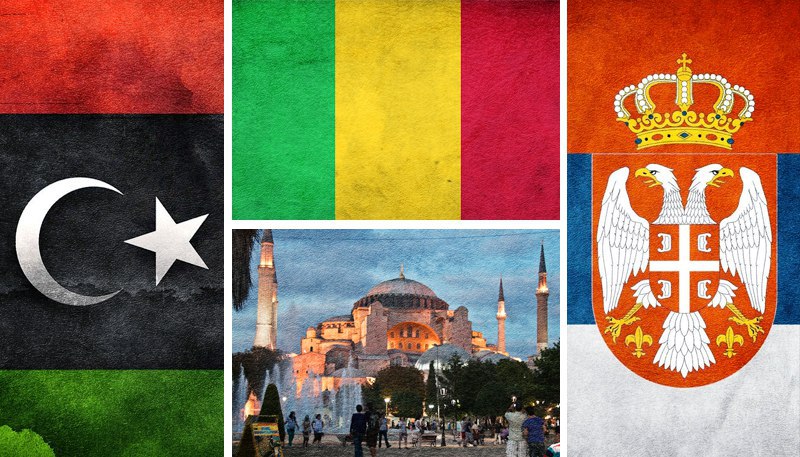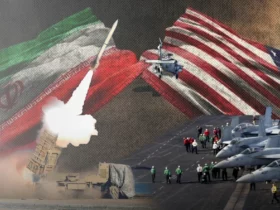Libya: UAE air strikes
On July 5, Al-Watiya airbase in north-west Libya was attacked and some equipment air defense systems were damaged.
The air base came under attack for the first time since May 18, when it was liberated from the illegal armed groups of Khalifa Haftar.
Later, representatives of the Government of National Accord (GNA) of Libya blamed the UAE for the air strike. A prominent political scientist from the UAE, Abdul Khaliq Abdullah, first published and then deleted a tweet regarding the al-Watiya airbase attacks which said “The Emirates, on behalf of the noble Arabs, taught Turkey the lesson it deserves”.
https://uwidata.com/12323-al-watiya-airstrikes-is-the-uae-adding-oil-to-the-libyan-fire/
As we have noted, it is likely that the UAE is trying to ignite a conflict in Libya, provoking Ankara to strike again and force Sirte and Egypt to act decisively. By doing so, any possibility of reconciliation between Turkey and Egypt will be eliminated.
Serbia: mass protests
On the night of Tuesday to Wednesday (July 7-8), thousands of Serbian citizens took to the streets of Belgrade, dissatisfied with the reintroduction of quarantine measures (including curfews) in the city due to a new outbreak of COVID-19. However, the protests quickly escalated into riots and clashes with police.
The protest was organized by Savez za Srbiju, a group of opposition parties that boycotted the June 21 parliamentary elections.
The Serbian newspaper Alo reported that the protest in Belgrade was attended by mercenaries of the American private military company Blackwater and Serbian citizens who had previously fought in eastern Ukraine on the side of the Ukrainian armed forces. Serbian President Aleksandar Vucic said that foreign services were involved in the protests which unfolded throughout the country. According to the authorities, all of this is an attempt at a coup d’etat.
In turn, Vucic is accused by opponents of close ties with the US, the EU and NATO and attempts to negotiate with the Kosovo authorities to ensure Serbia’s accession to the European Union at the cost of abandoning the territory. Therefore, it is profitable for Vucic to file protests as a conspiracy of the West, hooligan pranks and actions of conspiracy theorists.
https://uwidata.com/11599-serbia-this-schizophrenia-has-to-stop/
Exchange of strikes between Armenia and Azerbaijan
On Sunday, July 12, on the border of Tovuz region of Azerbaijan and the Tavush region of Armenia, a military clash took place. Artillery was used. The shootout continued Monday night. Three dead soldiers were reported in Baku. The Armenian side claims that no soldiers have died. However, the Azerbaijani Defense Ministry has distributed video of the Armenian stronghold destroyed by a drone.
https://twitter.com/wwwmodgovaz/status/1282553714616741888?s=20
In connection with the military incident, Azerbaijani President Ilham Aliyev held a meeting of the Security Council.
Armenia has been occupying Nagorno-Karabakh since the early 1990s. The Azerbaijani population has been expelled from the region. Baku has always stated that it intends to regain control over Nagorno-Karabakh.
Armenia’s intransigence and unwillingness to at least partially normalize relations with Azerbaijan (for example, the concession of seven districts of Azerbaijan that are occupied by Armenians other than Nagorno-Karabakh) lead to regular tensions. This could eventually lead to a full-scale war.
Turkish Foreign Minister Mevlüt Çavuşoğlu said that Turkey will support Azerbaijan in connection with the aggravation of the situation on the border with Armenia.
Unrest in Mali
Back in June, thousands of people in Bamako protested against President Ibrahim Boubacar Keita. According to the protesters, he has failed to adequately address the country’s crises against the backdrop of the pandemic.
On July 11, with thousands of protests taking place in Mali, the National Assembly building was attacked and looted, and the building of the national broadcasting company ORTM was seized. The police used tear gas and small arms to disperse the demonstrators. Four people were killed in the protests.
Demonstrators are demanding that the Malian authorities strengthen security: there is an increasing number of terrorist attacks by various Islamist groups. In addition, protesters are demanding the immediate resignation of President Ibrahim Boubacar Keita.
The country’s president is rebuked for having failed to solve the problem despite active cooperation with France in the fight against terrorism.
Behind the protests is a conservative Imam, Mahmoud Dicko. As UWI has already written, his coming to power could seriously shake the prospects for French control over its former colonial possessions.
https://uwidata.com/11630-the-great-anti-french-revolution-in-mali-francafrique-fails/
The election of the president of Poland
On July 12, a second round of presidential elections was held in Poland. The country chose between the current head of state, a representative of the ruling party “Law and Justice” Andrzej Duda and the mayor of Warsaw, a member of the opposition liberal-conservative “Civic Coalition” Rafal Trzaskowski.
The result showed an obvious split within Poland. The eastern, poorer voivodeships preferred the incumbent president. In contrast, the wealthier regions bordering Germany and with access to the Baltic Sea voted for the opposition.
If we look at foreign policy, the main difference between the two candidates was their attitude towards the European Union and Germany. Duda and the silent leader of the country, the leader of “Law and Justice” party Jaroslav Kaczynski have a reputation of being Eurosceptics. Rafał Trzakowski, meanwhile, advocates for cooperation with the EU.
Thus, the presidential elections in Poland give the ruling party carte blanche for the implementation of pro-American and Euro-Sceptic foreign policy and conservative domestic policy.
US supports PKK affiliates
Mazlum Kobane, who leads the US-supported Syrian Democratic Forces (SDF) announced that he had held a meeting with the commander of the US CENTCOM – Gen. Frank McKenzie. Prior to that, the American commander had met with Prime Minister Mustafa al-Kadhimi and the Iraqi military leadership.
https://twitter.com/MazloumAbdi/status/1281599772411994113?s=20
Turkey actively criticizes the US military alliance with the Kurdish separatists of PYD-YPG. They are close to the terrorist “Workers’ Party of Kurdistan” and constitute a major part of the SDF formation.
At the same time, during the UN vote last week, China and Russia took Turkey’s side in the issue. They vetoed a resolution, which called for the operation of points to deliver humanitarian aid to the territories controlled by the separatists through the border crossings Bab al-Hawa and al-Yaroubia.
Hagia Sophia will become a mosque again
On Friday, the State Council of Turkey canceled the 1935 decree of the Government of Turkey to grant the status of a museum to Hagia Sophiain Istanbul. This decision gave the Turkish authorities a legitimate opportunity to turn the museum into a mosque.
Previously, many religious figures and cultural organizations around the world had opposed this step, stating that the monument belongs to all humanity.
Recep Tayyip Erdogan, President of Turkey, announced last spring that the status of the Hagia SophiaMuseum could be revised. It was reported that this was a kind of response to the recognition of Jerusalem as the capital of Israel by Washington.
At the same time, Erdogan promised that the doors of the mosque would be open to all, and entry there would be free. For a significant part of Turkey’s population and current leadership, turning AHagia Sophiafrom a museum into a mosque is a symbol of historical justice and sovereignty, especially given the external pressure.
At the same time, the Turkish opposition believes that this decision was made to strengthen the rating of President Recep Tayyip Erdogan. There is also a possibility that the decision to change the status of Hagia Sophiamay lead to complications in foreign policy, problems in the tourism industry and will invigorate anti-Turkish propaganda around the world.

















Leave a Reply